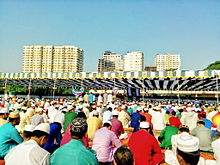Islamic culture in Bangladesh
Although Islam played a significant role in the life and culture of the
people, religion did not dominate national politics because Islam was
not the central component of national identity.
When in June 1988 an "Islamic way of life" was proclaimed for
Bangladesh by constitutional amendment, very little attention was paid
outside the intellectual class to the meaning and impact of such an
important national commitment.
However, most observers believed that the declaration of Islam as the
state religion might have a significant impact on national life. Aside from arousing the suspicion of the non-Islamic minorities, it
could accelerate the proliferation of religious parties at both the
national and the local levels, thereby exacerbating tension and conflict
between secular and religious politicians. Unrest of this nature was reported on some college campuses soon after the amendment was promulgated.
বাংলাদেশের ইসলামী সংস্কৃতি
যদিও ইসলাম মানুষের জীবন ও সংস্কৃতিতে গুরুত্বপূর্ণ ভূমিকা পালন করে, ধর্ম জাতীয় রাজনীতিতে প্রাধান্য পায়নি কারণ ইসলাম জাতীয় পরিচয়ের কেন্দ্রীয় উপাদান ছিল না। ১৯৮৮ সালের জুন মাসে সংবিধান সংশোধনের মাধ্যমে বাংলাদেশের জন্য একটি "ইসলামী জীবনধারা" ঘোষণা করা হলে, বুদ্ধিজীবী শ্রেণীর বাইরে এ জাতীয় গুরুত্বপূর্ণ জাতীয় অঙ্গীকারের অর্থ ও প্রভাবের প্রতি খুব কমই মনোযোগ দেওয়া হয়।
যাইহোক, অধিকাংশ পর্যবেক্ষক বিশ্বাস করেছিলেন যে ইসলামকে রাষ্ট্রধর্ম হিসাবে ঘোষণা জাতীয় জীবনে উল্লেখযোগ্য প্রভাব ফেলতে পারে। অ-ইসলামী সংখ্যালঘুদের সন্দেহ জাগানোর পাশাপাশি, এটি জাতীয় এবং স্থানীয় উভয় স্তরে ধর্মীয় দলগুলির বিস্তারকে ত্বরান্বিত করতে পারে, যার ফলে ধর্মনিরপেক্ষ ও ধর্মীয় রাজনীতিবিদদের মধ্যে উত্তেজনা এবং দ্বন্দ্ব আরও বেড়ে যায়।এই ধরনের অস্থিরতা কিছু কলেজ ক্যাম্পাসে রিপোর্ট করা হয়েছিল শীঘ্রই সংশোধনী জারি করা হয়েছিল।






_Ranthambhore_India_12.10.2014.jpg)



.png)





0 comments:
Post a Comment